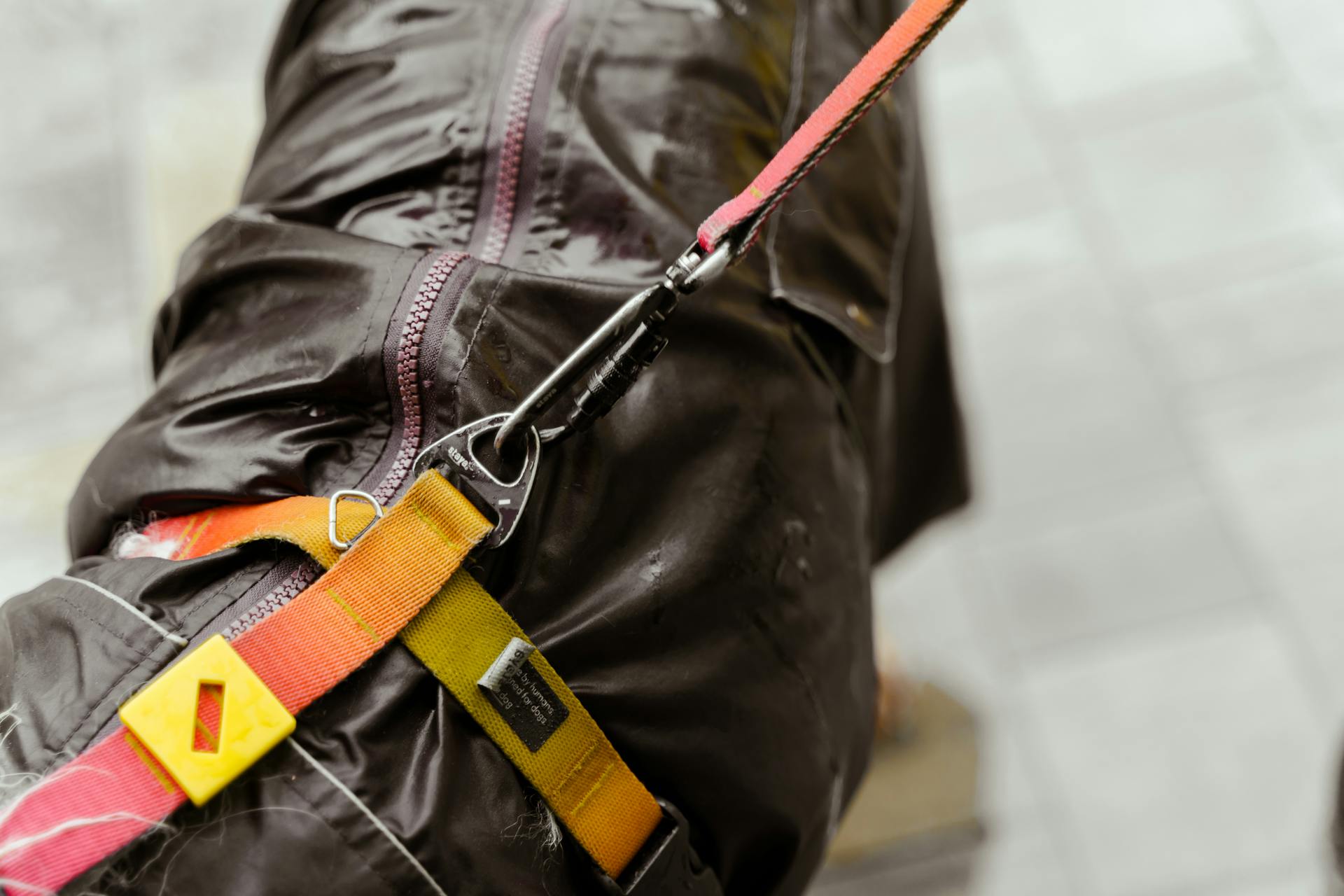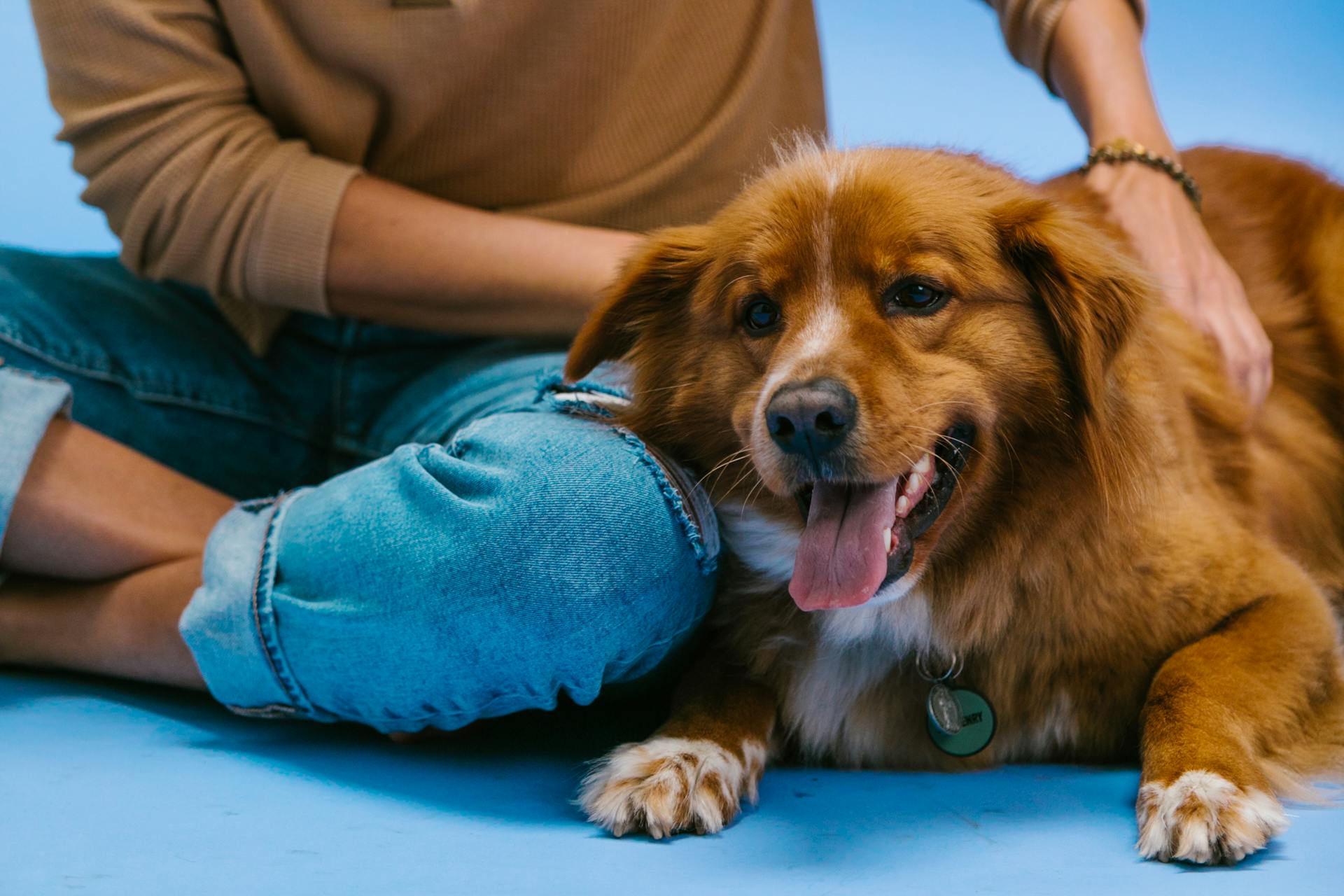
Losing a beloved pet is never easy, but it doesn't have to be a solo journey. Lap of Love Pet Loss Support is here to help you navigate the grieving process.
Their experienced team of veterinarians and pet loss support specialists understand the complexities of pet loss and are dedicated to providing compassionate care.
You can access their support 24/7 through their online community, where you can connect with others who have experienced pet loss, share your story, and find comfort in the knowledge that you're not alone.
Their support services are designed to help you process your emotions and find a way to move forward, even in the midst of overwhelming grief.
Curious to learn more? Check out: Emotional Support Animal
Understanding Grief
Grief is a natural response to the loss of a loved one, including our pets. The grieving process can take many different forms, and it's essential to be aware of the common signs of pet grief.
Sadness or loneliness, shock or disbelief, anger or irritability, guilt, physical symptoms, and avoidance of places that may remind you of your pet are all common signs of pet grief. You may also experience intense longing for your pet, difficulty concentrating, or momentarily believing you see or hear your pet.
The five stages of grief—denial, anger, bargaining, depression, and acceptance—can provide a framework for understanding the complex emotions experienced after the loss of a pet. These stages aren't linear, and many people may move back and forth between them during the grieving process.
Signs of Grief
Grief can manifest in many different ways, and it's essential to be aware of the common signs to help you navigate the process.
Sadness or loneliness is a common sign of pet grief, as it's a natural response to the loss of a beloved companion.
Shock or disbelief can also occur, making it difficult to accept the reality of the situation.
Anger or irritability can arise, often directed at oneself or others, and guilt is another common emotion that can weigh heavily on your mind.
Physical symptoms like loss of appetite or difficulty sleeping are also possible, as grief can take a toll on your physical health.
Avoidance of places that may remind you of your pet is a coping mechanism that can help you temporarily escape the pain of grief.
Intense longing for your pet is a sign that you're still deeply connected to them, and it's okay to feel this way.
Difficulty concentrating can make everyday tasks feel overwhelming, but remember that grief is a process that takes time.
Here are some common signs of pet grief:
- Sadness or loneliness
- Shock or disbelief
- Anger or irritability
- Guilt
- Physical symptoms (including loss of appetite or difficulty sleeping)
- Avoidance of places that may remind you of your pet
- Intense longing for your pet
- Difficulty concentrating
- Momentarily believing you see or hear your pet
Stages of Grief
The stages of grief are a universal experience that can be felt after losing a loved one, including our furry friends. The five stages of grief – denial, anger, bargaining, depression, and acceptance – can provide a framework for understanding the complex emotions experienced after the loss of a pet.
The stages of grief can be non-linear, and many people may move back and forth between them during the grieving process. Denial is a common stage, where people may feel shocked or disbelieving about the loss of their pet.
Anger and bargaining can also be intense emotions, where people may feel frustrated or guilty about the circumstances of their pet's passing. Depression can be a heavy stage, where people may feel overwhelmed by sadness and loss.
Acceptance is the final stage, where people can begin to come to terms with their loss and find ways to honor their pet's memory. It's a process that takes time, patience, and support.
Here are the stages of grief in a concise list:
- Denial
- Anger
- Bargaining
- Depression
- Acceptance
It's essential to remember that everyone experiences grief differently, and there's no set timeline for working through the stages.
Emotional Coping
Emotional Coping is a crucial part of the healing process after losing a pet. Time really does tend to mend a broken heart, and eventually, you'll start to know when the time is right for you to move forward.
Grief is different for everyone, and it's okay to feel a range of emotions. You may experience denial, anger, bargaining, depression, and acceptance, just like after losing a human loved one. These stages aren't linear, and many people may move back and forth between them during the grieving process.
Take a look at this: Move Cat
To cope with your emotions, consider incorporating reminders of your pet into your daily life, like displaying photos around your home. You can also share memories with friends who knew them well, which can help you process the loss and find joy in the happy times you shared with your pet.
Here are some mental health resources to help cope with pet grief:
Anger
Anger is a common emotion that can surface after the loss of a pet. It's a normal reaction to feelings of powerlessness and unfairness.
You might feel angry towards yourself, others, the veterinarian, or even the pet for leaving. This emotion can be intense and all-consuming, making it hard to focus on other things.
As Dr. Fenkel notes, anger or irritability is one of the common signs of pet grief. It's a sign that you're struggling to come to terms with the loss and the emotions that come with it.
It's essential to acknowledge and accept these feelings, rather than trying to suppress them. By doing so, you can begin to process your emotions and move forward in the grieving process.
Here are some common emotions you might experience during the grieving process:
- Anger or irritability
- Guilt
- Shock or disbelief
- Sadness or loneliness
Coping with
Coping with pet loss can be a challenging and emotional experience. Grief is different for everyone, and it's okay to take your time to process your emotions.
You may feel a range of emotions, including sadness, anger, and guilt. Dr. Fenkel recommends that you allow yourself to feel these emotions, rather than trying to suppress them.
It's normal to feel a sense of denial or shock after losing a pet. This can make it difficult to accept the reality of the situation. However, with time, you'll start to come to terms with the loss.
You can start to heal by incorporating reminders of your pet into your daily life, such as displaying photos around your home. Sharing memories with friends who knew your pet well can also be helpful.
If the grief of losing your pet is impacting your daily life, consider seeking professional help. You can join a pet loss support group or set up a therapy session with a licensed mental health professional.
Here are some common signs of pet grief to be aware of:
- Sadness or loneliness
- Shock or disbelief
- Anger or irritability
- Guilt
- Physical symptoms (including loss of appetite or difficulty sleeping)
- Avoidance of places that may remind you of your pet
- Intense longing for your pet
- Difficulty concentrating
- Momentarily believing you see or hear your pet
Remember, everyone experiences grief differently, and there's no set timeline for healing. Be patient with yourself and allow yourself to feel your emotions.
Frequently Asked Questions
How to deal with the guilt of euthanizing a pet?
Grieving without judgment is key to healing, so allow yourself to feel and honor your pet's memory. Focus on celebrating their life, not rationalizing their passing
How long is it normal to grieve a pet?
Grief from losing a pet can last from weeks to years, with healthy grief gradually decreasing in intensity over time. The duration of grief varies from person to person, and it's essential to allow yourself the time and space to process your emotions.
Sources
- https://www.charliehealth.com/post/pet-grief
- https://www.petage.com/lap-of-love-veterinary-returns-to-in-home-pet-hospice-care-nationwide/
- https://www.lapoflove.com/our-services/pet-loss-support
- https://www.lapoflove.com/pet-loss-support-resources
- https://www.lapoflove.com/pet-loss-support-resources/children-and-pet-grief-resources
Featured Images: pexels.com


